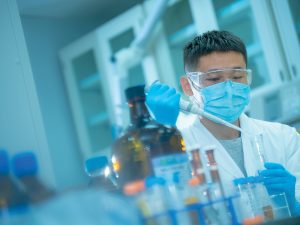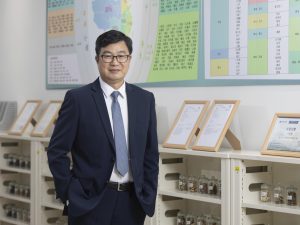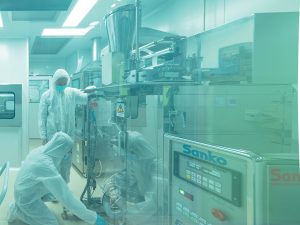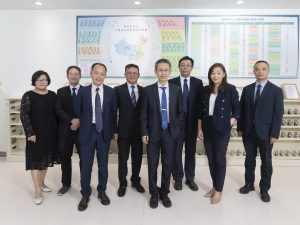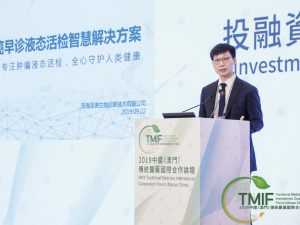In line with the national development strategy, the Macao Special Administrative Region (SAR) government has laid out a plan to seize the opportunities brought by the Guangdong-Hong Kong-Macao Greater Bay Area and the Guangdong-Macao In-Depth Cooperation Zone in Hengqin and to develop the health industry with Chinese medicine research and development (R&D) and manufacturing as an entry point. In response to the demand for health industry professionals in Macao, the Greater Bay Area, and the entire country, the University of Macau (UM) has optimised its academic programmes and has launched degree programmes in areas such as global public health and medicinal administration with the goal of training interdisciplinary professionals for the industry.
Supporting the Chinese Medicine Industry through Education and Research
As an international public university in the Macao SAR, UM began to nurture outstanding professionals and accumulated research resources for the development of the Chinese medicine industry in Macao 20 years ago; this industry is poised to grow today.
Established in 2002, the Institute of Chinese Medical Sciences (ICMS) is dedicated to training high-calibre and globally oriented professionals in Chinese medicine for Macao through innovative Chinese medicine research as well as master’s and doctoral degree programmes in the areas of biomedical sciences and medicinal science. Approved and established in 2011, the State Key Laboratory of Quality Research in Chinese Medicine (SKL-QRCM) focuses on the study of innovative technologies and methodologies in quality research in Chinese medicine as well as key technologies for the R&D of new Chinese medicines. The lab is also dedicated to research on international quality standards for Chinese medicine and has made impressive progress in pushing forward the standardisation and internationalisation of Chinese medicine.
ICMS and SKL-QRCM strive to conduct quality research in Chinese medicine, initiate research on original topics, and strengthen the transfer of research results to help promote economic diversification of Macao. In terms of academic performance, professors working in the laboratory have published over 3,000 articles in journals covered by the Science Citation Index (SCI), with a total of over 68,000 citations, and the quantity and quality of the papers have improved year on year. With the integration of technologies such as artificial intelligence and advanced materials, the laboratory has made breakthroughs in areas such as drug discovery, drug delivery, quality standardisation, and international registration. In terms of the transfer of research results, the laboratory and the Macao Centre for Research and Development in Chinese Medicine have joined hands at various stages to carry out more than ten industry-academia collaboration projects on innovative drugs, classic Chinese medicine recipes, famous varieties, and rapid testing. In terms of international influence, the laboratory has established quality standards for more than 20 Chinese medicinal plants for authoritative publications such as United States Pharmacopeia, European Pharmacopoeia, and Chinese Pharmacopoeia. Chinese Medicine, an SCI-indexed journal edited by SKL-QRCM staff, continues to be the flagship journal in the field of Chinese medicine. The laboratory was also awarded the Medal of Merit – Professionals by the Macao SAR government in 2021 for its achievements.
Located in the Research Building in the north of UM’s campus, ICMS shares the same building with the laboratories of the Faculty of Health Sciences (FHS). According to Chen Xin, director of ICMS and an expert in Chinese medicine and immunology, UM established the Macao Centre for Research and Development in Chinese Medicine in 2020 with the support of the Science and Technology Development Fund, adding that it is in the process of establishing the Macao Centre for Testing of Chinese Medicine to further improve the R&D platform for Chinese medicine and promote the integration of industry, universities, and research institutes in Chinese medicine. ICMS is fully committed to supporting the Macao SAR government’s industrial development policy and aims to use Chinese medicine as an entry point to promote the development of the health industry. ‘We have an international faculty team with strong teaching and research capabilities. After 20 years of hard work, we have produced more than 800 master’s and PhD degree graduates to support the development of the Chinese medicine industry in Macao and the entire country,’ says Prof Chen. ‘Many of the graduates have gone on to work as executives in industrial parks, pharmaceutical companies, hospitals, or health departments in Macao, mainland China, and other regions. Some of them have set up biotechnology companies in the cooperation zone in Hengqin to contribute to the development of the health industry.’
Optimising Disciplinary Layout for the Health Industry
Released in September 2021, the Master Plan of the Development of the Guangdong-Macao In-depth Cooperation Zone in Hengqin has provided new opportunities to promote the development of the Chinese medicine industry. According to the Second Five-Year Plan for Economic and Social Development of the Macao SAR (2021-2025), Macao’s future economic growth will come from the health industry, with Chinese medicine R&D and manufacturing as an entry point, as well as the industries of modern finance, high technology, exhibitions, trade, culture, and sports. To further promote the development of the Chinese medicine industry in Macao, the Macao SAR government upgraded the Health Bureau’s former Department of Pharmaceutical Affairs to the Pharmaceutical Administration Bureau in January 2022, and a law governing pharmaceutical activities within the scope of traditional Chinese medicine and the registration of traditional Chinese medicines came into force at the same time. This series of policies has provided an impetus for the development of the health industry.
To respond to the demand for health industry professionals in Macao, the Greater Bay Area, and the entire country, UM has optimised its academic programmes and disciplinary layout in recent years. In 2021, the university combined the teaching resources of FHS and ICMS to create three departments, namely the Department of Biomedical Sciences, the Department of Pharmaceutical Sciences, and the Department of Public Health and Medicinal Administration. The university also introduced new academic programmes and enhanced existing programmes. Through the three departments, UM currently offers three bachelor’s degree programmes, in biomedical sciences, bioinformatics, and pharmaceutical sciences and technology, and four master’s degree programmes, in data science – precision medicine, Chinese medical science, global public health, and medicinal administration. In addition, UM offers a PhD programme in biomedical sciences.
Xiang Yutao, head of the Department of Public Health and Medicinal Administration, who is an active researcher in areas such as clinical psychiatric epidemiology and clinical psychiatry, says that public health is a science concerned with improving the health of populations, adding that the core scientific components of public health include prevention, epidemiology, surveillance, bioinformatics, health and medicinal administration, and laboratory science. ‘Over the past two years or so, many universities around the world have placed a special emphasis on the development of public health programmes. UM also established the Department of Public Health and Medicinal Administration in a timely manner and launched the Master of Science in Global Public Health programme via the department from a crisis management perspective. The programme aims to equip students with knowledge of global public health, epidemiology based on public health, statistical analysis, epidemic disease, health policy management, and related risk management,’ says Prof Xiang.
Graduates Pursue Careers in Medicine and Health Industries
In 2002, UM began to offer a research-oriented Master of Philosophy in Medicinal Administration programme, which has produced many outstanding graduates for the industry.
According to Hu Yuanjia, associate head of the Department of Public Health and Medicinal Administration, graduates of the programme are working in different sectors of society: Some are working in state-level departments or committees in China to help shape the national policy for pharmaceutical development; Some are working in supervisory positions in government departments or hospitals in Macao or mainland China to support the implementation of the Healthy China initiative; Some are working in top pharmaceutical companies in China or abroad, including Pfizer, Johnson & Johnson, GSK, Jiangsu Hengrui Medicine, and Mindray Medical International; Some are working in the world’s leading analytics companies or consultancies such as Clarivate and IQVIA, and a few of them have become industry leaders. In addition, some of the graduates have gone on to pursue further studies abroad and work in leading universities and research institutes in Europe and the United States.
A graduate of the master’s programme in 2018, Zhang Jinglu has co-founded several biomedical technology companies with his partners and is currently leading research teams in mainland China and the United States to develop high-tech products. ‘The medicinal administration programme offered by UM is globally oriented and covers a wide range of topics. It aims to systematically enhance students’ analytical skills and has taught me how to view problems from different perspectives. I can say that my postgraduate study has laid an important foundation for my current work in the development of medical technology and the management R&D teams,’ says Zhang.
UM plans to launch a master of science programme in medicinal administration in the 2023/2024 academic year. ‘In response to the demand of Macao and the entire country for healthy industry professionals, the Master of Science in Medicinal Administration programme will be course-based and practice-driven to enhance the practical skills of postgraduate students and cultivate professionals who can better meet the needs of the development of the Chinese medicine industry,’ says Prof Hu.
Providing Medicinal Administration Training from a Global Perspective
Medicinal administration is a multidisciplinary field that incorporates principles and theories of medical science, management, economics, sociology, law, and international business to solve problems in the medical field. Ung Oi Lam, assistant professor in ICMS and a member of the faculty team for the Master of Science in Medicinal Administration programme, is a pharmacist who worked for many years in a pharmaceutical regulatory unit in Macao to study the latest developments of pharmaceutical systems and the regulation of pharmaceutical products.
Prof Ung joined UM in 2017 and is currently the programme director (global affairs) of ICMS. She says that while placing a focus on Macao, the master’s programme is also regionally and globally oriented, as it aims to provide knowledge across disciplines such as social and administrative pharmacy, health industry innovation, and social medicine for students from a global perspective. ‘We focus on nurturing students who are skilled in the application of theories, methods, and techniques related to pharmacy, medicine, sociology, technological innovation, economics, law, and management, with a view to producing medicinal administration professionals who can promote the sustainable development of related policies,’ says Prof Ung. ‘Our programme covers both Chinese and western medicinal administration. Some of the courses are specifically tailored to the context of Macao, while some other courses aim to provide training based on the latest global trends in medicinal administration, so that graduates will be better equipped to pursue career development in Macao, in mainland China, or even in other parts of the world.’
Source: UMagazine ISSUE 26

